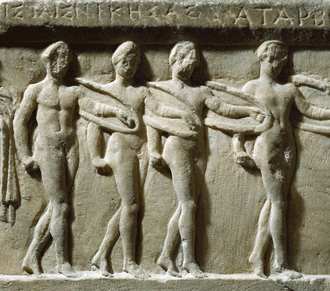Ancient Greek Music remains one of the least illuminated chapters of the History of Greek Culture. Despite the fact that we have access to information concerning the role of music in everyday life, a great deal of significant information concerning the sound and the way it was played remains unknown. The studies of ancient sources reveal that the role of music in ancient Greece was far more complicated than that of music nowadays. Music nowadays is part of our everyday routine and a means of entertainment, there are, however, certain kinds which are considered to be the elite of music and are addressed to the initiated and the music-lovers.
Music in the everyday life of Ancient Greece
In ancient Greece music was an integral part of people’s everyday routine and due to the fact that music was a complicated form of art as well as a cultural expression, it was highly regarded and present in all private and public festivities. Music, Asma-the singing and lyrics - Orchisis – group of dancers as well as the song between the acts -were features of a highly civilized community as well as factors and indicators of a higher quality of life. From the archaic period music gradually assumed a more complicated form and role, the result of this development was that special music competitions were organized in many parts of Ancient Greece. Some of the oldest music competitions ever registered are the “Karnea” in ancient Sparta which was a place were music was highly respected and connected with the training and education of the youth.
 |
| Naked men dancing the Pyrichios |
Except being an important element in both public and private celebrations, music played an important role on unpleasant occasions and it made daily hardships more tolerable. Music was a main feature in celebrations such as weddings, banquets, social gatherings and moments of joy but also a valuable companion in everyday routine. A flute player for instance would accompany the women with his music while they were kneading, the workers during harvest, the oarsmen as well as the soldiers on their way to battle. Music was closely connected with sports and athletic games not only because they included music competitions but because the music would encourage and motivate the athlete to achieve a better performance.
The divine nature of Music
According to the ancient Greeks, music was divine as it assisted in healing both soul and body. It purified and soothed people’s souls and it inspired, encouraged and helped them relax. The above mentioned features justified the presence of Music, Asma and Orchisis in religious festivities such as the “Panathinea” held in Athens.
Music and other Art forms
Music is closely related to other sciences such as mathematics and philosophy thus it was one of the important subjects in young people’s education. Besides, its connection to the theatre and poetry was of major significance. Masterpieces of ancient Greek literature such as the Homeric epics and Ancient Tragedies were preserved thanks to music. It is an indisputable fact that music has made an invaluable contribution to the development and diversity of the Ancient Greek culture.
Sources of the Ancient Greek Music
It was believed that music was not particularly developed compared to other art forms in ancient Greece. This was due to the lack of written sources concerning ancient Greek music. Gradually, our knowledge of the role and the importance of music in ancient Greece were enriched thanks to the systematic research of all relevant sources. Thus, from lyric poetry we get lots of information concerning musical instruments while from literature or historical texts we learn a lot about prominent musicians of the time and their works.
A depiction on pots, mosaics, relieves, murals, coins and statues are an invaluable source of information concerning musical instruments and their evolution from the archaic period to the Roman times. Detailed pot decorations are a rich source of information concerning the form and shape of many instruments about which we would otherwise know nothing. Very few findings of instruments were discovered, mostly flute and rarely fragments of other instruments, such as the lyre.
Elements of ancient Greek music have also been traced in Byzantine and Traditional Greek music by researchers. The most valuable and important sources of information however, are detected and preserved in surviving scores as well as other surviving texts on harmonics such as the texts “Armonika” and “Rythmika Stichia” written by Aristoxenos Tarantinos – perhaps the most distinguished musician of the 4th century B.C.
Surviving Works
The very few surviving scores however are fragmentary, for instance some inscriptions on stones, manuscripts on papyrus etc, therefore they fail to give a full idea of the wealth and grandeur of the ancient Greek music. This music reveals the sense of moderation and harmony which are important features of the Greek civilization. All in all, sixty-one music pieces have survived to our time and if we exclude “Seikilos pillar” none of the surviving texts is complete.
 |
| Seikilos pillar |
The most important preserved text is the “Delphic Hymn”. It is inscribed on pillars and was found in Delphi. These invaluable extracts reveal important information about ancient Greek music. This hymn was presented during the “Pythia” in 128 BC. The pillars with the inscriptions are exhibited in the Delphi museum.





1 comments:
I am glad you take pride in what you write. This makes you stand way out from many other writers that push poorly written content.
fever μπουζουκια
Post a Comment